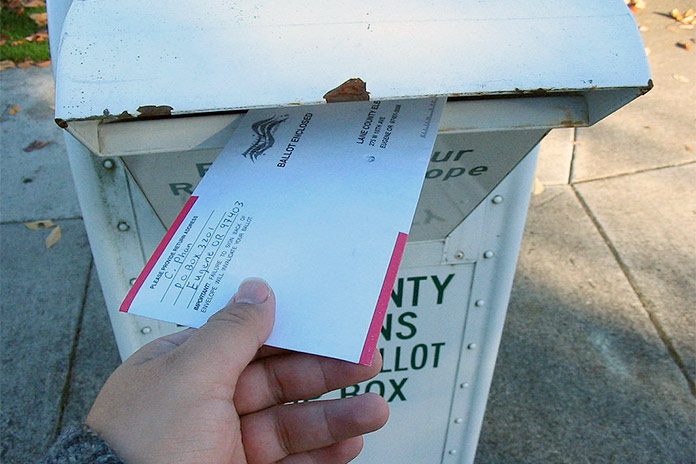By Julia Shumway
Efforts to change Oregon’s voting system are on the move in the state Legislature and among citizen groups trying to write laws at the ballot box.
The House last week voted mostly along party lines to approve , Speaker Dan Rayfield’s proposal to establish ranked-choice voting in statewide elections beginning in 2028. The bill’s prospects in the Senate are unclear as Republicans continue a walkout that prevents the Senate from voting on any bills, but citizen groups have also launched initiative campaigns for voters to make ranked-choice voting, or another form that uses stars to rate candidates, the new standard.
Benton County, where Rayfield lives, has used ranked-choice voting in local elections since 2020. Maine, Alaska and cities and counties throughout the country already use ranked-choice voting.
Voters rank candidates based on their preference. If a candidate wins a majority of first-place votes, they win the election. Otherwise, the candidate with the fewest number of first-place votes is eliminated and votes from the people who liked that candidate best are reallocated to their second-place pick. That process continues until one candidate receives a majority.
Supporters say it allows voters to pick their favorite candidate without worrying about choosing the lesser of two evils and cuts down on campaign toxicity, because candidates will want people who prefer another candidate to rank them highly.
Rayfield said the process was simple enough that his son, who was 9 years old when Benton County first began using ranked-choice voting, could understand it.
“We start ranking things in grade school,’ he said. “Which color do we like best? Which food do we like best? Ranking is not complicated.”
His bill would require the state to use ranked-choice voting to select nominees and eventual candidates for president, vice president, U.S. senators and representatives, governor, secretary of state, treasurer, attorney general and commissioner of the Bureau of Labor and Industries. The last is a nonpartisan position that has a runoff election in November if a candidate doesn’t receive a majority of the vote in the May primary election. Rayfield’s proposal would eliminate the need for a second election because a candidate would end up with a majority because of ranked-choice voting.
The bill also would allow, but not require, local governments and service districts to adopt ranked-choice voting for local elections. It wouldn’t apply to candidates for the state Legislature, which Rayfield said was a compromise with county clerks who were worried about not having enough space on ballots if they needed to give voters enough room to rank every candidate.
“Personally speaking, I would love to see legislative races included down the road and in my perfect policy, it would absolutely be there,” Rayfield said.
Even if the measure passes the Senate, voters still would need to approve it in the 2024 election for it to take effect.
Rayfield’s measure passed nearly along party lines, with Republican Rep. Charlie Conrad of Dexter joining 34 Democrats in voting for the bill and every Republican voting against it.
Rep. Bobby Levy, R-Echo, said the ranked-choice voting would enable fringe candidates to win elections.
“Voters risk seeing their least favorite choice for office receive unearned support,” she said. “A candidate would ride into office without a true mandate to govern.”
If Rayfield’s measure doesn’t pass this session or in the short legislative session in 2024, a group is preparing a citizen initiative to bring it to the ballot. Mike Alfoni, chief petitioner for the Voter Choice Act, told the Capital Chronicle he’s focused now on getting something passed through the Legislature.
“What we’re looking at with a citizen’s initiative is sort of a backstop to just ensure that voters will have the opportunity to vote on this one way or the other in 2024,” he said.
Separately, a group that includes state Rep. Zach Hudson, D-Troutdale, is pushing for Oregon ballots to come with star ratings. STAR voting, which stands for “score then automatic runoff,” has been used by political parties in internal elections but not in any official elections.
Under STAR voting, voters have the option to give every candidate between 0 and 5 stars. There are two rounds of counting. First, vote-counters would tally up the total number of stars each candidate received.
The two candidates with the most stars would go to an automatic runoff, with the winner being the person preferred by the most voters.
Deanna Kallen, one of the chief petitioners for a ballot initiative seeking to enact STAR voting statewide, said she initially supported ranked-choice voting before learning more about STAR voting.
“The reason why we advocate for STAR voting over ranked choice voting is because STAR voting actually provides an equally weighted vote,” she said. “What that means is, mathematically, my vote weighs the same as yours. We could balance each other out, so if I vote one way, you could vote equal and opposite.”
A political action committee supporting the cause has raised less than $2,000 since it launched last year, according to state campaign finance records. As of April 24, the group had collected 102 of the more than 120,000 signatures needed by summer 2024 to get the initiative on the November ballot.
This story first appeared in the Oregon Capital Chronicle.











